
Eyewitness Account from
Palestine / Israel
Eyewitness Account from Palestine / Israel Produced by Berkeley Citizen |
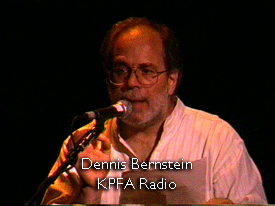 |
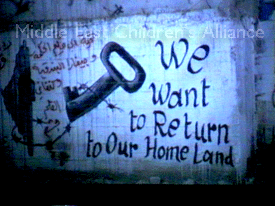 |
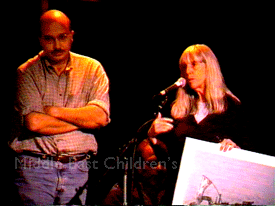 |
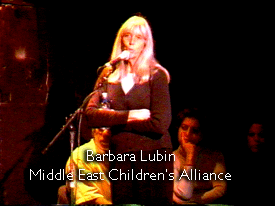 |
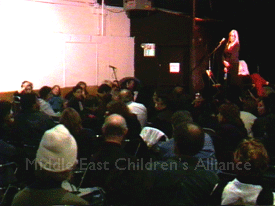 |
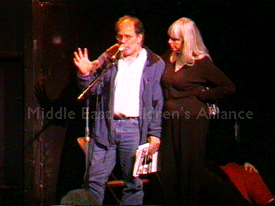 |
 |
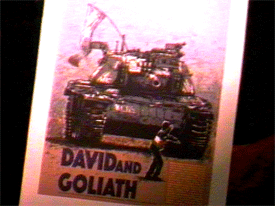 |
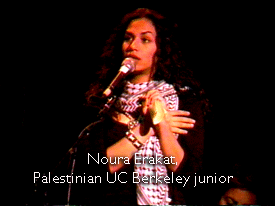 |
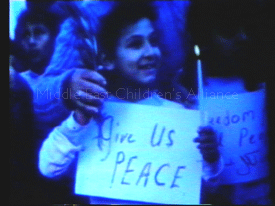 |
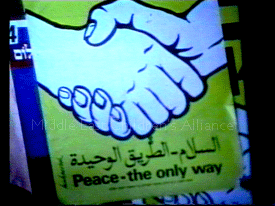 |
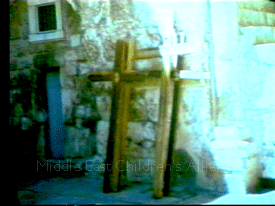 |
Thinking globally, acting with love
By Robin Shulman
Berkeley Daily Planet, November 11, 2000
Middle East Children’s Alliance Director Barbara Lubin, back from a recent visit to Palestine, reveals the horror of war, the thirst for a homeland. Barbara Lubin was one of the only passengers on the flight Friday, October 13 to Tel Aviv. After the plane landed in the rain at night, Lubin said, she caught a taxi to the West Bank city of Bethlehem. But Israeli soldiers refused to let her past the checkpoint into the city, Lubin said. So at 1 a.m. the Berkeley-based activist scrambled over 10-foot concrete blocks to enter the closed area. The taxi driver threw her suitcase after her.
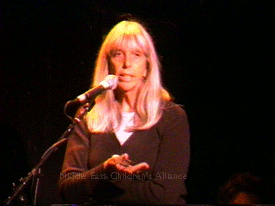 Lubin is a woman who goes to great lengths to bear witness.
Lubin is a woman who goes to great lengths to bear witness.
Wearing a silver pendant in the shape of the whole of British Mandate Palestine, and swinging her straight silver hair, Lubin spoke about her recent trip Wednesday night at La Pena Cultural Center on Shattuck Avenue.
More than 250 people crammed in, with standing room only, to view slides and hear Lubin, the executive director of the Middle East Children’s Alliance.
During 14 days in the Middle East, Lubin stayed in Bethlehem’s Dheisheh refugee camp, in a guest house built by her group. She filed daily radio reports to KPFA-radio from scenes of violence as she traveled in Israel, the West Bank and Gaza.
She said she was moved to visit as she watched on television scenes of the clashes, which were ignited Sept. 28, when Israeli leader Ariel Sharon brought 1,000 soldiers to the Muslim prayer site at Jerusalem’s Noble Sanctuary, known to Jews as the Temple Mount. The move unleashed Palestinians’ deep frustration with the peace process, after seven years of negotiations under the Oslo process brought no end in sight to the Israeli occupation.
Lubin brought back stories and slides both intimate and political. In Dheisheh, she said, “kids were either out throwing stones or just hanging around because schools were closed.” Lubin bought them 17 computers. “The kids don’t sleep during the night. They’re wetting their beds. They’re talking to their parents about dying,” Lubin said.
The Middle East Children’s Alliance was started by Lubin and Howard Levine in 1988 to work for peace in the West Bank, Gaza and Israel. Later the mission expanded to Lebanon and Iraq. The alliance has built playgrounds, delivered medicine and food, and led delegations of Americans to visit the Middle East. “It’s looking for what we can do as Americans to change our foreign policy and really make it work for peace in Palestine and Israel,” said Lubin.
Lubin considers her own eyewitness accounts key to conveying a picture of Middle East events to people back home. One night on this most recent trip,
Lubin said, it was pitch black outside when a light came on from the sky.
Israeli soldiers started shooting toward Palestinian homes from American-made Apache helicopters, she said, and 10 masked Palestinian men shot back. By day, she said, it is a different war, of Palestinian children armed with rocks fighting Israeli combat soldiers shooting live fire. One day at a demonstration, Lubin saw five Palestinian young people killed. Lubin’s slides record details beyond the reports in the U.S. media of the deaths of 193 people, almost all Palestinian. Her slides show walls in the West Bank city of Ramallah plastered with the faces of young people who died. Another slide shows tables where, Lubin said, thousands of Palestinians signed petitions calling for an international peace force to protect them. Doctors, nurses and ambulance drivers protested Israel’s shooting on medical personnel in another slide.
“What’s a settlement? This is what a settlement looks like,” Lubin said, showing a plain tract development. “A little bit like Orinda.” She also showed photographs of bypass roads, an alternate highway network for Jews to drive safely from West Bank settlements to Jerusalem or Tel Aviv. Her slides create a sense of the patchwork of Palestinian-controlled and Israeli-occupied areas of the West Bank.
Lubin was raised on right-wing Zionist Jewish values. She did not become active on Middle East issues until she was elected to the Berkeley Board of Education in 1982 and a group of students asked why she was silent on the Israeli invasion of Lebanon. “I said, ‘I’m Jewish,’” recalls Lubin. “They said, ‘So what?’”
At La Pena, Lubin, a longtime local activist, knew much of her audience by name. “It’s very important to have this kind of audience-the progressive community, the Jewish community,” said Arab activist Osama Qasem, 30, a graduate student in industrial engineering at UC Berkeley. The event raised $5,500 for the alliance. But some said the alliance should go further still.
“It’s kind of the same story over and over. We know what’s going on. We need to bring people in power to see that,” said one woman on the Berkeley housing commission. Eyad Kishawi, 30, of the Palestinian group Al Awda, lauded Lubin’s commitment, and also said his group plans to launch a campaign for American divestment in Israel.
“There’s a big difference between people going to visit Palestine and
Israel-and people who actually live there,” said Noura Erakat, a Palestinian UC Berkeley junior. “When you visit, you see what you want. When you live there, it’s all brought to you,” she said. “We have tear gas we get to smell before going to sleep.”
For more information: https://www.mecaforpeace.org/
Berkeley Citizen © 2003
All Rights Reserved
All Rights Reserved